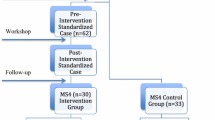ABSTRACT
BACKGROUND
Although interns are expected to be competent in handoff communication, it is currently unclear what level of exposure, participation, and comfort medical students have with handoffs prior to graduation.
OBJECTIVE
The aim of this study is to characterize passive and active involvement of third-year medical students in the major components of the handoff process.
DESIGN
An anonymous voluntary retrospective cross-sectional survey administered in 2010.
PARTICIPANTS
Rising fourth-year students at two large urban private medical schools.
MAIN MEASURES
Participation and confidence in active and passive behaviors related to written signout and verbal handoffs during participants’ third-year clerkships.
KEY RESULTS
Seventy percent of students (n = 204) responded. As third-year medical students, they reported frequent participation in handoffs, such as updating a written signout for a previously admitted patient (58 %). Students who reported frequent participation (at least weekly) in handoff tasks were more likely to report being confident in that task (e.g., giving verbal handoff 62 % vs. 19 %, p < 0.001). Students at one site that did not have a handoff policy for medical students reported greater participation, more confidence, and less desire for training. Nearly all students believed they had witnessed an error in written signout (98 %) and almost two-thirds witnessed an error due to verbal handoffs (64 %).
CONCLUSIONS
During their third year, many medical students are participating in handoffs, although reported rates differ across training environments. Medical schools should consider the appropriate level of competence for medical student participation in handoffs, and implement corresponding curricula and assessment tools to ensure that medical students are able to effectively conduct handoffs.


Similar content being viewed by others
REFERENCES
Nasca TJ, Day SH, Amis ES Jr, ACGME Duty Hour Task Force. The new recommendations on duty hours from the ACGME Task Force. N Engl J Med. 2010;363(2):e3.
APDIM Survey 2010. Available at http://www.im.org/toolbox/surveys/APDIMSurveyData/Documents/2010_APDIM_summary_web.pdf. Accessed on November 8, 2012.
Aiyer MK, Vu TR, Ledford C, Fischer M, Durning SJ. The subinternship curriculum in internal medicine: a national survey of clerkship directors. Teach Learn Med. 2008;20(2):151–156.
Farnan JM, Paro JA, Rodriguez RM, Reddy ST, Horwitz LI, Johnson JK, Arora VM. Hand-off education and evaluation: piloting the observed simulated hand-off experience (OSHE). J Gen Intern Med. 2010;25(2):129–134.
Singh H, Thomas EJ, Petersen LA, Studdert DM. Medical errors involving trainees: a study of closed malpractice claims from 5 insurers. Arch Intern Med. 2007;167(19):2030–2036.
Horwitz L, Moin T, Krumholz H, Wang L, Bradley E. Consequences of an inadequate sign-out for patient care. Arch Intern Med. 2008;168(16):1755–1760.
Vidyarthi AR, Arora V, Schnipper JL, Wall SD, Wachter RM. Managing discontinuity in academic medical centers: strategies for a safe and effective resident sign-out. J Hosp Med. 2006;1(4):257–266.
Arora V, Johnson J, Lovinger D, Humphrey HJ, Meltzer DO. Communication failures in patient sign-out and suggestions for improvement: a critical incident analysis. Qual Saf Health Care. 2005;14(6):401–407.
Sterkenburg A, Barach P, Kalkman C, Gielen M, ten Cate O. When do supervising physicians decide to entrust residents with unsupervised tasks? Acad Med. 2010;85(9):1408–1417.
Green ML, Aagaard EM, Caverzagie KJ, Chick DA, Holmboe E, Kane G, Smith CD, Iobst W. Charting the road to competence: developmental milestones for internal medicine residency training. J Grad Med Educ. 2009;1(1):5–20.
Arora V, Kao J, Lovinger D, Seiden SC, Meltzer D. Medication discrepancies in resident sign-outs and their potential to harm. J Gen Intern Med. 2007;22(12):1751–1755.
Seiden SC, Galvan C, Lamm R. Role of medical students in preventing patient harm and enhancing patient safety. Qual Saf Health Care. 2006;15(4):272–276.
Chu ES, Reid M, Burden M, Mancini D, Schulz T, Keniston A, Sarcone E, Albert RK. Effectiveness of a course designed to teach handoffs to medical students. J Hosp Med. 2010;5(6):344–348.
Klamen DL, Reynolds KL, Yale B, Aiello M. Students learning handovers in a simulated in-patient unit. Med Educ. 2009;43(11):1097–1098.
Bray-Hall S, Schmidt K, Aagaard E. Toward safe hospital discharge: a transitions in care curriculum for medical students. J Gen Intern Med. 2010;25(8):878–881.
Acknowledgements
The authors wish to thank Kimberly Beiting for her administrative support and the medical school students for their participation in the study survey. We acknowledge Laura Ruth Venable for her editorial assistance with manuscript preparation. This study was determined to be exempt by the Institutional Review Board at the University of Chicago. This work was previously presented at the 2011 AAMC RIME oral abstract presentation in Denver, CO and the 2011 Senior Scientific Session at the Pritzker School of Medicine in Chicago. This study received funding from Department of Medicine Excellence in Medical Education Award.
Conflict of Interest
Vineet Arora has previously received funding from the Accreditation Council for Graduate Medical Education (ACGME).
Author information
Authors and Affiliations
Corresponding author
Electronic supplementary material
Below is the link to the electronic supplementary material.
ESM 1
(DOCX 18 kb)
Rights and permissions
About this article
Cite this article
Arora, V.M., Eastment, M.C., Bethea, E.D. et al. Participation and Experience of Third-Year Medical Students in Handoffs: Time to Sign Out?. J GEN INTERN MED 28, 994–998 (2013). https://doi.org/10.1007/s11606-012-2297-9
Published:
Issue Date:
DOI: https://doi.org/10.1007/s11606-012-2297-9




